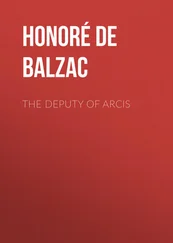“Holy Virgin!” exclaimed Nanon, overhearing the words.
“A partridge!” whispered Eugenie to herself; she would gladly have given the whole of her little hoard for a partridge.
“Come and sit down,” said his aunt.
The young dandy let himself drop into an easy-chair, just as a pretty woman falls gracefully upon a sofa. Eugenie and her mother took ordinary chairs and sat beside him, near the fire.
“Do you always live here?” said Charles, thinking the room uglier by daylight than it had seemed the night before.
“Always,” answered Eugenie, looking at him, “except during the vintage. Then we go and help Nanon, and live at the Abbaye des Noyers.”
“Don’t you ever take walks?”
“Sometimes on Sunday after vespers, when the weather is fine,” said Madame Grandet, “we walk on the bridge, or we go and watch the haymakers.”
“Have you a theatre?”
“Go to the theatre!” exclaimed Madame Grandet, “see a play! Why, monsieur, don’t you know it is a mortal sin?”
“See here, monsieur,” said Nanon, bringing in the eggs, “here are your chickens,—in the shell.”
“Oh! fresh eggs,” said Charles, who, like all people accustomed to luxury, had already forgotten about his partridge, “that is delicious: now, if you will give me the butter, my good girl.”
“Butter! then you can’t have the galette .”
“Nanon, bring the butter,” cried Eugenie.
The young girl watched her cousin as he cut his sippets, with as much pleasure as a grisette takes in a melodrama where innocence and virtue triumph. Charles, brought up by a charming mother, improved, and trained by a woman of fashion, had the elegant, dainty, foppish movements of a coxcomb. The compassionate sympathy and tenderness of a young girl possess a power that is actually magnetic; so that Charles, finding himself the object of the attentions of his aunt and cousin, could not escape the influence of feelings which flowed towards him, as it were, and inundated him. He gave Eugenie a bright, caressing look full of kindness,—a look which seemed itself a smile. He perceived, as his eyes lingered upon her, the exquisite harmony of features in the pure face, the grace of her innocent attitude, the magic clearness of the eyes, where young love sparkled and desire shone unconsciously.
“Ah! my dear cousin, if you were in full dress at the Opera, I assure you my aunt’s words would come true,—you would make the men commit the mortal sin of envy, and the women the sin of jealousy.”
The compliment went to Eugenie’s heart and set it beating, though she did not understand its meaning.
“Oh! cousin,” she said, “you are laughing at a poor little country girl.”
“If you knew me, my cousin, you would know that I abhor ridicule; it withers the heart and jars upon all my feelings.” Here he swallowed his buttered sippet very gracefully. “No, I really have not enough mind to make fun of others; and doubtless it is a great defect. In Paris, when they want to disparage a man, they say: ‘He has a good heart.’ The phrase means: ‘The poor fellow is as stupid as a rhinoceros.’ But as I am rich, and known to hit the bull’s-eye at thirty paces with any kind of pistol, and even in the open fields, ridicule respects me.”
“My dear nephew, that bespeaks a good heart.”
“You have a very pretty ring,” said Eugenie; “is there any harm in asking to see it?”
Charles held out his hand after loosening the ring, and Eugenie blushed as she touched the pink nails of her cousin with the tips of her fingers.
“See, mamma, what beautiful workmanship.”
“My! there’s a lot of gold!” said Nanon, bringing in the coffee.
“What is that?” exclaimed Charles, laughing, as he pointed to an oblong pot of brown earthenware, glazed on the inside, and edged with a fringe of ashes, from the bottom of which the coffee-grounds were bubbling up and falling in the boiling liquid.
“It is boiled coffee,” said Nanon.
“Ah! my dear aunt, I shall at least leave one beneficent trace of my visit here. You are indeed behind the age! I must teach you to make good coffee in a Chaptal coffee-pot.”
He tried to explain the process of a Chaptal coffee-pot.
“Gracious! if there are so many things as all that to do,” said Nanon, “we may as well give up our lives to it. I shall never make coffee that way; I know that! Pray, who is to get the fodder for the cow while I make the coffee?”
“I will make it,” said Eugenie.
“Child!” said Madame Grandet, looking at her daughter.
The word recalled to their minds the sorrow that was about to fall upon the unfortunate young man; the three women were silent, and looked at him with an air of commiseration that caught his attention.
“Is anything the matter, my cousin?” he said.
“Hush!” said Madame Grandet to Eugenie, who was about to answer; “you know, my daughter, that your father charged us not to speak to monsieur—”
“Say Charles,” said young Grandet.
“Ah! you are called Charles? What a beautiful name!” cried Eugenie.
Presentiments of evil are almost always justified. At this moment Nanon, Madame Grandet, and Eugenie, who had all three been thinking with a shudder of the old man’s return, heard the knock whose echoes they knew but too well.
“There’s papa!” said Eugenie.
She removed the saucer filled with sugar, leaving a few pieces on the table-cloth; Nanon carried off the egg-cup; Madame Grandet sat up like a frightened hare. It was evidently a panic, which amazed Charles, who was wholly unable to understand it.
“Why! what is the matter?” he asked.
“My father has come,” answered Eugenie.
“Well, what of that?”
Monsieur Grandet entered the room, threw his keen eye upon the table, upon Charles, and saw the whole thing.
“Ha! ha! so you have been making a feast for your nephew; very good, very good, very good indeed!” he said, without stuttering. “When the cat’s away, the mice will play.”
“Feast!” thought Charles, incapable of suspecting or imagining the rules and customs of the household.
“Give me my glass, Nanon,” said the master
Eugenie brought the glass. Grandet drew a horn-handled knife with a big blade from his breeches’ pocket, cut a slice of bread, took a small bit of butter, spread it carefully on the bread, and ate it standing. At this moment Charlie was sweetening his coffee. Pere Grandet saw the bits of sugar, looked at his wife, who turned pale, and made three steps forward; he leaned down to the poor woman’s ear and said,—
“Where did you get all that sugar?”
“Nanon fetched it from Fessard’s; there was none.”
It is impossible to picture the profound interest the three women took in this mute scene. Nanon had left her kitchen and stood looking into the room to see what would happen. Charles, having tasted his coffee, found it bitter and glanced about for the sugar, which Grandet had already put away.
“What do you want?” said his uncle.
“The sugar.”
“Put in more milk,” answered the master of the house; “your coffee will taste sweeter.”
Eugenie took the saucer which Grandet had put away and placed it on the table, looking calmly at her father as she did so. Most assuredly, the Parisian woman who held a silken ladder with her feeble arms to facilitate the flight of her lover, showed no greater courage than Eugenie displayed when she replaced the sugar upon the table. The lover rewarded his mistress when she proudly showed him her beautiful bruised arm, and bathed every swollen vein with tears and kisses till it was cured with happiness. Charles, on the other hand, never so much as knew the secret of the cruel agitation that shook and bruised the heart of his cousin, crushed as it was by the look of the old miser.
Читать дальше












